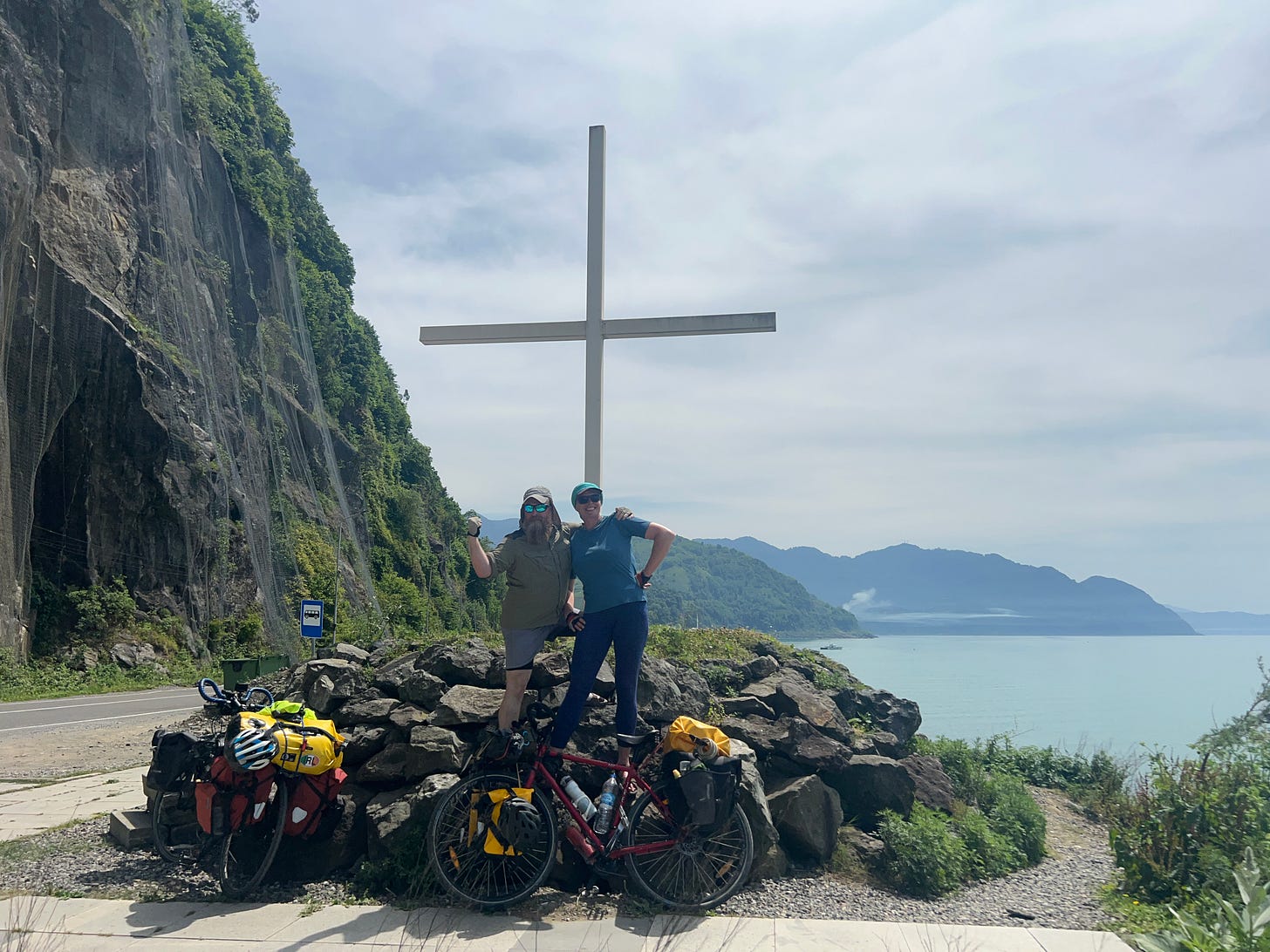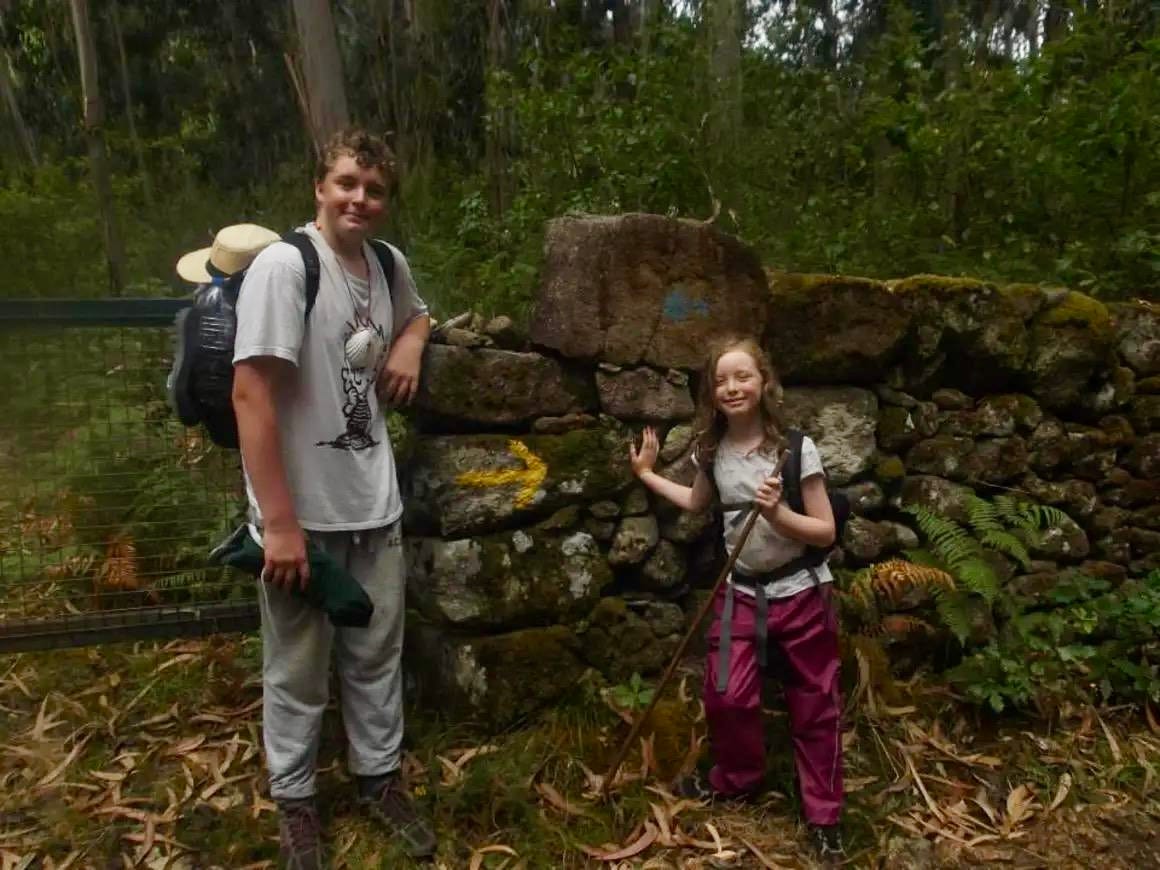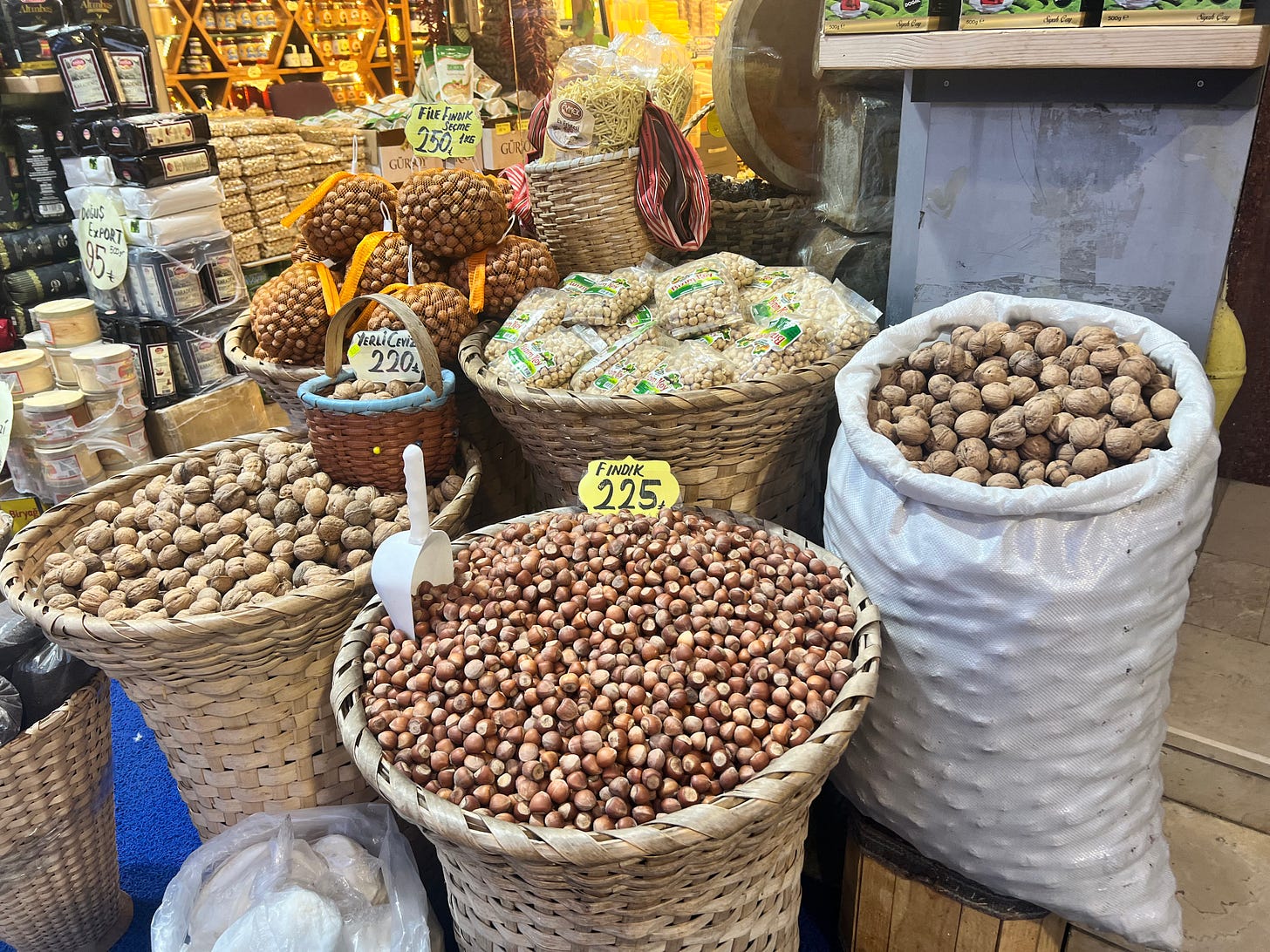Georgia on our minds
Week 16 - Spoke Yokes wave a sad farewell to Türkiye through the eastern Black Sea towns of Tirebolu, Trabzon and Rize, and cross the border to Georgia with great anticipation!
On Monday afternoon, we crossed the border from Türkiye into Georgia.
On Sunday, we passed the 6,000km mark on our journey, after spending a very interesting Saturday night bedding down on the top floor of a tea house in Rize, falling asleep to the sound of the clack and thump of Okey tiles and the occasional roar of laughter or outburst of arguing.
Our host, Mustafa, lets cyclists sleep in his tea house because he himself is a cyclist, and president of Rize Cycling Club.
It was particularly appropriate to be sleeping in a tea house in Rize, the eastern Black Sea town that as Mark put it, puts the “tea in Türkiye.” It’s estimated that every second adult in Rize district is somehow employed in connection with tea: even the smallest plots on its steep hillsides are covered in terraces of tea plants.
The air in the region is fragrant with the smell of tea. Loose tea leaves tumble towards you on the road as you cycle, borne on the updraft of passing trucks. Tiny tea plants from cuttings are sold at the roadside.
We stopped in to Vatançay tea factory some 30km before Rize and got to see a little of the process and sample their wares. unfortunately, it’s not practical to carry a sack of tea on a bike and so I had to buy only a small quantity of teabags to take with us for our morning brew.
Rather hilariously, they were having a photoshoot while we were there, with a professional photographer shooting three young women dressed in traditional dress, dancing and embarrassedly pretending to pick tea in a few tea bushes bordering the car park: Mark asked if he could take some pictures too, and with clever cropping, they really kind of do look like a young woman in impractically ornamental clothing is foostering around a tea plantation, and that tells you a lot about how visually led platforms like Instagram lead to us believing lots of lies.
One thing that is not easy to get across in photos is how incredible the mountainous backdrop of these last few days has been, with a constant view of the snowcapped Kaçkar mountain range hovering behind the tea-green hills that plunge straight down to the sea.
I can’t believe it’s the end of six incredible weeks in Türkiye. I had a brief desire to cry and kiss the ground as I was leaving, because I kid you not, I have fallen head over heels for the country.
But our last day’s cycling on Monday was quite hectic: a blur of busy roads, kilometres and kilometres of truckers from Azerbaijan, Turkmenistan and Uzbekistan parked up on the road and reducing the two-lane highway to one lane from Hopa onwards on the Turkish side of the border, and many tunnels to navigate.
From Samsun onwards, and since our last post, we have mostly been cycling along on the flat on the D010, the main coastal road along the Black Sea: I felt a twinge of longing as we left it at Hopa, where the D010 turns inland towards the Kars region, passing some spectacular scenery in the mountains near Artvin. And then I told myself that that road is for a different time, and that we can come back.
Highlights in the last week have been meeting German long-distance cyclists Mihaela and Franck on the roadside, and staying a night in the incredibly atmospheric town of Tirebolu, a place with layers of history dating back to Pliny the Elder, and our last night in Türkiye, when we were blessed to find a very beautiful campsite where the river Firtina meets the sea in an almost Alpine setting.

Arriving into Georgia comes with a big sense of achievement: not many people can say they’ve cycled the entire length of the Black Sea coast in Türkiye. It’s a privilege to have done so and we are very grateful to all the kind people who have helped us along this unforgettable stretch of our journey.
Learning through the mundane
More than a decade ago, I took my children, then eight and 13, on the Caminho Portugues - a 600km pilgrimage route from Sintra, near Lisbon, to Santiago in Northern Spain. It was an epic adventure, and one we still talk about.

In Coimbra, seized by the total happiness of getting to grips with a slow adventure in an unfamiliar country, we were walking back to our hostel from the shops one evening when I earnestly told my daughter Ava, 8, that I really felt like we were living in Portugal.
She looked at me and sighed her most world-weary sigh and said, “mum, that’s because you’ve just bought toilet paper here for the first time.”
With an astute ability she retains to this day, she had expressed something that I think contains an important grain of truth: when you get to grips with mundane things in new places, you do start to live in them.
Slow adventures like long walks and cycles give much more opportunity for such things than flying in for a week’s holiday in a hotel: it’s by things like shopping and cooking and taking public transport that you really come to understand a place.
In Türkiye, I have driven a car, posted mail, used a vacuum cleaner, gotten photocopies, taken intercity buses and an internal flight, and even though we can’t even pretend to have begun to understand that vast and varied country, these things, as well as the daily demands of looking after our basic needs on the road, have given us a certain insight, and for me, a deep desire to return.
The climate, landscapes and flora and fauna of the Black Sea have been a revelation: I’m not going to harp on about them any more here because I did a fair bit of that in my last post, but really there have been so many days of wonder and happiness here.
But no fairytale exists without its big bad wolf: there have been challenges and dark sides to our time in Türkiye too.
Things I love about Türkiye and never want to forget:
Three women on the back of a tractor on their way up to the hazel orchards, laughing wholeheartedly as I mimed begging a tow off them on a particularly steep hill near Cide. Most of the agricultural workers we saw were women, clad in headscarves, loose pants, sturdy boots and tool belts.
Towels drying on racks outside barbershops in the sun.
A lot of faces have melded into one great big beautiful open expression of welcome. Before we arrived in Türkiye, we met a person from a Nordic country who had been living in Istanbul for five years: they expressed a sad level of cynicism regarding the famous Turkish hospitality, and told us that in their experience, the welcome always came with fine print, and that in Istanbul, people were always out for personal gain of some sort. In our experience of Turkish people, this could just not be further from the truth. Our time here has been punctuated with constant, daily spontaneous gestures of kindness and welcome that we have already written about in these pages, with nothing asked or expected in return. As we pushed our bikes up a steep, narrow cobbled street to the boarding house in Tirebolu, a tea shop owner yelled “Hoş geldiniz!” and came rushing out of his shop to present both of us with a small, fragrant cube of Lokum (Turkish delight) as we passed. He was not looking for payment or anything in return. This has been our experience.
The smell of woodsmoke coming from the stoves in tea houses in small villages.
Lizards tussling for territory on the side of the hard shoulder and scattering as the bike comes past.
Bulk-buying: boy do Turkish people love to buy things in enormous quantities! All the main supermarket chains (SOK, Migros, BIM and A101) carry vast buckets of yoghurt, 10kg sacks of rice and flour, and 5l cans of olive oil as standard. In Samsun recently, I had a hard time explaining to a street veg vendor that I didn’t want to buy 3kg of peppers, but three peppers. He looked at me like I was slightly nuts. At home, I love nothing more than bulk buying: it cuts down on packaging, and you don’t run out of basics. On a bike, it can make finding carryable quantities of things like rice or oil a bit difficult. But I still love it: it speaks to cooking for large families, to an appreciation of good quality staples, to a certain kind of practicality that is warm, like home.
The deafening squelchy quacks of marsh frogs any time there’s a stream or pond nearby.
The call to prayer. Yes, even the 4am one.
Washing and cleanliness. Mark wrote last week about some of the positives he feels are connected to faith in Türkiye: to me, the presence of water and washing facilities at every mosque and tiny hilltop prayer room is an awesome thing, as are the extremely stringent rules around food preparation. I don’t think it’s any coincidence that I have had what Mark disgustingly likes to call “a dicky tummy” a few times in Hungary and Romania, but not at all in Türkiye.
The colours. A couple of nights ago we camped in a municipal campsite next to Ordu-Giresun airport, whose runway is built on a strip of reclaimed land in the sea. This made for an interesting night’s sleep with planes landing periodically, but it was cheap, and had toilets and showers. Before getting into the tent, we were sitting alongside the sea singing a few songs when the sun set: rows of vivid red Turkish flag bunting hung for May 19 flapped in the breeze against the backdrop of the deepening orange sky, and the water was reluctant to shed its turquoise day hue. In the hills, the early summer leaves are a fanfare of greens colliding with a brilliant blue sky. We have had some overcast days where things are more muted, but as soon as the sky is clear and the sun is out, every different colour is accentuated.
Things I won’t miss about Türkiye:
These things are not necessarily unique to Türkiye, and we can expect much more to come, but in the interests of balance, some of the things I won’t miss include:
the sad state of the very large number of stray cats and dogs.
the feeling of bodily surrender, a little like feeling yourself turn into a sack of jelly, that comes over you when cycling through a tunnel with the overwhelming roar of an approaching truck getting louder and louder, and knowing that you CAN’T wobble and have to hold a straight line.
The merry little warning honk of a driver behind you relinquishing his responsibility for close passing you at speed.
Kangal dogs in the mountains with razorblades embedded in their collars, for the bears.
The occasional leery response to a female cyclist: I’ve been mostly covered up a fair bit because the norm in Türkiye outside of cities is for a fair amount of modesty. It’s still a country with a lot of gender division and seeing the aul lads finger their prayer beads nervously in response to my presence at rural tea shops (I have never gone inside one - they just aren’t for women - but have sat in the shade outside them, which has been tolerated because we are strangers that don’t know the rules) is not the most comfortable feeling.

A new language
One of the things that is now happening to us is that, after six weeks in Türkiye and just as we feel we are getting to grips with the basics of communicating, we find ourselves castaways on the shores of a whole new language.
The first Turkish word I learned after “hello” and “thank you” was “area.” Cycling gives your brain a LOT of time to pick up words, but the language you siphon off the roadsides is a curiously useless and disjointed selection of nouns: what good to me are the words for “builders providers,” “kitchen and bathroom,” “marble and granite,” “car wash”?
On the European side before Istanbul, I had said to Mark, “Jesus, this Alan lad has a monopoly on amenities.” We had been passing a load of signs for Piknik Alani, Kamping Alani, and my silly brain told me that Alani was a name - Alan, with a suffix denoting ownership, I presumed. The next day, it clicked: “I think Alani means area!” I said in triumph. This crossword puzzle-like deduction continues; you see a word in numerous different contexts and suddenly you know what it means.
It’s with a certain pride that you then begin to be asked if you speak Turkish…but you don’t. You can order a coffee, and even specify how much sugar you want (Turkish coffees are made with the sugar mixed in, so ordering your coffee orta is with a medium amount of sugar) but the intricacies of grammar are still far beyond you.
And just as you begin to get a handle on it, you leave: we experienced the same thing in Romania. A day before we crossed over into Bulgaria, we were thrilled to discover that we had gotten through an entire day where we felt like we basically knew what was happening and what people were saying to us. And then we were gone.
It’s probably apt in some ways that it was on Sunday, our last day in the country, that I learned that the correct response to Hoş Geldiniz, the cry of welcome that greets you in every town and village in Türkiye: I had been saying Teşekkürler (thank you) as this feels natural.
But the real response is actually Hoş Bulduk - a far more apt response. It translates as “we feel welcomed.” And nothing could have been more true.
Shortly after you cross the border into Georgia, which prides itself on having converted to Christianity in the fourth century, there is a roadside statue of St Andrew next to a waterfall, and alongside it, a plaque that reads:
Path through Georgia - an enlightening path
We’re both pretty sure that it will be.
Hold her steady and keep it between the ditches!











Oh you're in for a treat in Georgia! Listen for some polyphonic singing there. Different songs for different reasons, differences between regions, glorious! I enjoyed your Turkish experience. So heartwarming to hear even with the challenges, that it still was an overall positive part of your trip.
Great read! Well done on getting across Turkey... waiting to hear about the next few countries with great interest. Safe travels folks :)